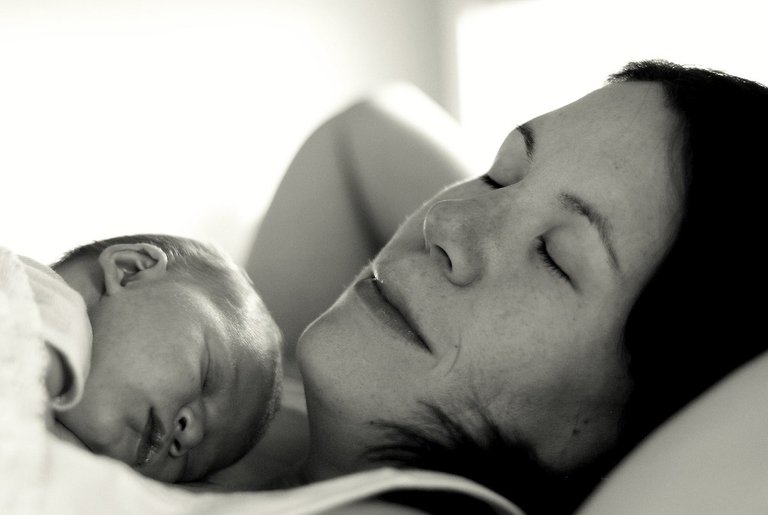Dangers of Postpartum Depression and Handling it.
The fact that I was left alone to take care of my newborn after three weeks when I was still healing from viganal tear and stressed myself put me in such a position that I thought I was losing my mind, the stress was very intense and from time to time I will result to some corner of the room to cry my heart out.
When my baby fails to sleep and I have to rock him, or when he wakes up at the time I am trying to catch a little nap, I will hold him in my arms and cry my heart out, the stress was pretty intense and it was telling on me. I kept to myself most of the time, worried something could go wrong with my mind.

flickr.com
I immediately knew something could go wrong if I didn't find a way around it, the good thing is I am getting better by the day and I am handling things better, but several women go into postpartum depression after childbirth.
The birth of a new child comes with a variety of strong emotions, from joy to excitement, joy, and anxiety, but with all these feelings, it could also generate depression. Most new mothers experience baby blues after childbirth, this comes with the feeling of anxiety, mood swings, crying spells, and difficulty sleeping. Baby blues usually start 2-3 days after delivery.
Baby blues last for only a few days, but a more severe case is the experience of postpartum depression, it can also be called peripartum depression because for some women it begins during pregnancy and continues even after childbirth.
It is usually a trigger caused by birth complications, but prompt treatment could help manage associated symptoms and help the mother bond properly with the child.
Postpartum depression affects up to 15% of people, it is normal to have worries and doubts, especially as a first-time mother, but if you start to feel extremely sad or lonely, have frequent crying spells, and experience severe mood swings, it may be an indication of postpartum depression.
Apart from baby blues and postpartum depression, postpartum psychosis is another form of after-child birth problem, this is an even more severe form of postpartum depression that requires urgent medical attention. This relatively rare condition affects 1 amongst 1,000 people after delivery and could last from a few weeks to months.

needpix.com
The symptoms of postpartum psychosis are; confusion, a feeling of shame and hopelessness, serious agitation, insomnia, hallucinations, paranoia, rapid speech, hyperactivity, and mania. This feeling requires instant medical attention because there is a possibility of attempted suicide and even inflicting harm on the baby. Treatment will most times include; hospitalization, medication, and psychotherapy.
The chances of postpartum depression are increased in cases of;
- Marital or relationship conflict.
- Limited social support.
- Pregnancy complications like difficult delivery, premature birth, and other health conditions.
- Family history of depression.
- Not in support of the pregnancy.
Postpartum depression can adversely affect the ability of a mother to parent, it makes a mother unable to care for her baby, reduces her energy level, feeling moody, and trouble focusing on the needs of the baby, and has a higher chance of committing suicide, so it is essential to reach out for help when needed.
Researchers also believe that postpartum depression in a mother can as well adversely affect the healthy development of a child, causing;
- A child cries more and has more agitation.
- Problem with learning and language development.
- Behavioural issues.
- The child may have issues dealing with stress and adjusting to other social situations.
- Shorter height and higher risk of obesity.
Speaking about your symptoms to people who care is the first step to healing, then getting a professional who will help you create a good plan that will work for you is the next line of action.
Have a therapy session with a mental health professional who can help you understand and cope with your challenges.
At a time like this, self-care is highly essential, do all you can to get as much rest as you need, eat lots of nutritional food, and consume fruits and vegetables.
There are support groups provided for people who are going through a similar situation to give others warmth and comfort.
Sometimes, medications like antidepressants are recommended, and some of them may take several weeks before they begin to work.
In the case of postpartum psychosis, you may be admitted to a treatment center for days until you get stable. In the case where you fail to respond to treatment, electroconvulsive therapy (ECT) is recommended.
Having a support system at home in the form of your partner or Mum is helpful, also having someone you can speak to about how you feel is usually helpful. Never forget to seek help when necessary.
For Further Studies.
https://www.womenshealth.gov/mental-health/mental-health-conditions/postpartum-depression
https://www.mayoclinic.org/diseases-conditions/postpartum-depression/symptoms-causes/syc-20376617
https://www.nhs.uk/mental-health/conditions/post-natal-depression/overview/
https://www.marchofdimes.org/find-support/topics/postpartum/postpartum-depression
https://my.clevelandclinic.org/health/diseases/9312-postpartum-depression

Hi, I am Tobi, a writer, speaker, relationship blogger, and lover of good music. I love making friends and learning from people. If you want to hear me speak on relationships and general life issues, you can find my YouTube channel where you can watch any episode for free, please do not forget to subscribe, friends. I sincerely appreciate every love I get from here, Kindly do well to keep them coming.
This is one reason why a lot of mothers just go for CS so they can beat the trauma that goes with natural birth even when it looks cool from the outside. Well-done, I must commend your ability to stay strong.
The entire process of birthing a child isn't easy at all, a lot is at stake. Thank you, dear friend
It takes incredible strength to open up about such a challenging experience. Thank you for sharing your journey with postpartum depression and shedding light on this important issue.
Your resilience is inspiring, and your advice on seeking help and self-care is invaluable.
Wishing you continued healing and strength as you navigate motherhood.
Thank you, dear friend, I plan to continue to share my experience to help people who may need to navigate the same path.
that's just beautiful. I will be looking out for
Thanks for your contribution to the STEMsocial community. Feel free to join us on discord to get to know the rest of us!
Please consider delegating to the @stemsocial account (85% of the curation rewards are returned).
Thanks for including @stemsocial as a beneficiary, which gives you stronger support.
It's actually a problem in today's world as most mothers are face with post partum psychosis. Back then mothers always visit there children or invite them over to the house just to help them for 1-3 months after child birth. This practice always lessen the stress on new mothers as they usually have time to sleep and rest very well. It's very nice for this practice to continue in our society so as to help reduce this issues in our society. Thanks for the write up ☺️☺️
Unfortunately, everyone is rather engaged in more jobs to keep up with livelihood these days (including grandmothers), therefore making it difficult to stay out of their comfort zones for long, especially when long distance is involved and the family isn't financially stable. However, it remains the best practice as it helps mothers a lot., appreciate the comment friend.
The society is just so busy.. we will scale through